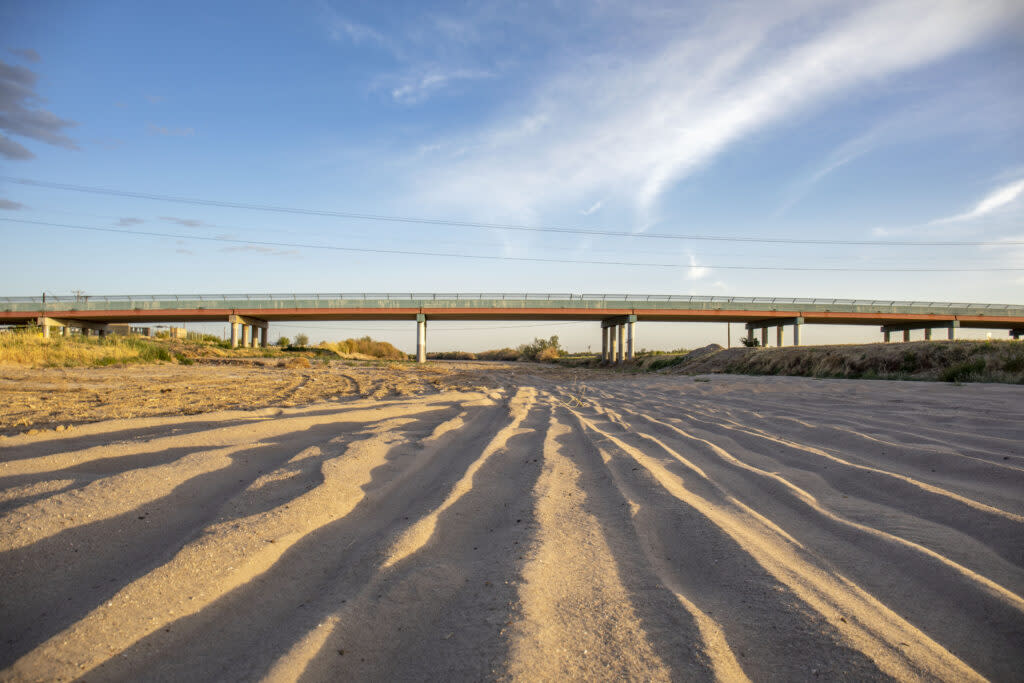U.S. Supreme Court rejects NM and Texas deal on Rio Grande

- Oops!Something went wrong.Please try again later.
The Vinton stretch of the Rio Grande just north of El Paso at Vinton Road and Doniphan Drive on May 23, 2022. The river below Elephant Butte Reservoir in Southern New Mexico through Far West Texas is dry most months of the year, only running during irrigation season. (Photo by Diana Cervantes for Source NM)
The U.S. Supreme Court is allowing the federal government to block the deal Texas and New Mexico proposed to end a decade of litigation over Rio Grande water.
The narrow 5-4 decision made Friday morning raises the question if the states and the federal government will go back to the negotiation table, or fight it out in the courtroom.
The order stated that the 2022 deal hammered out between New Mexico, Colorado and Texas to measure water deliveries at El Paso, and would officially allocate the river in southern New Mexico and far west Texas at a 57-43 split, and end a decades long dispute between the states over the Rio Grande.
The federal government argued that the proposed deal – called a consent decree – unfairly imposed conditions it did not consent to, and that it had the authority to object to the deal, pointing to treaty obligations to deliver water to Mexico, and contracts with two regional irrigation districts.
Justice Michael Melloy, a federal appeals judge overseeing the case as special master, recommended the U.S. Supreme Court approve the deal, over the federal government’s objections.
The crux of the ruling was determining if the federal government could object to the deal, even if it was not a signatory on the Rio Grande Compact, the 85-year old legal agreement dividing the river.
In the majority decision, Justice Ketanji Brown Jackson said the court finds the states’ deal unfairly excluded the “unique federal interests.”
“We cannot now allow Texas and New Mexico to leave the United States up the river without a paddle. Because the consent decree would dispose of the United States’ Compact claims without its consent,” Jackson wrote.
Jackson pointed to the court’s prior recognition that the federal government had valid claims under the 1939 Rio Grande Compact when allowing them to intervene as a party in 2018.
“Our 2018 decision leads inexorably to the same conclusion today: The United States has its own, uniquely federal claims under the Compact. If it did not, one might wonder why we permitted the Federal Government to intervene in the first place,” Jackson wrote.
Justices John Roberts,Brett Kavanaugh, Elena Kagan, and Sonia Sotomayor joined Jackson in the majority.
Justice Neil Gorsuch, in his dissent, wrote the court should have followed the recommendation of the Special Master to approve the deal, but instead, overturned years of water law precedents.
“The Court’s decision is inconsistent with how original jurisdiction cases normally proceed. It defies 100 years of this Court’s water law jurisprudence,” he said.
Justices Sam Alito, Clarence Thomas and Amy Coney Barrett joined Gorsuch in dissent.
State Engineer Mike Hamman, New Mexico’s top water official, who retires at the end of June, said in a statement he was disappointed in the court’s decision.
“We need to keep working to make the aquifers in the Lower Rio Grande region sustainable, and lasting solutions are more likely to come from parties working together than from continued litigation,” he said in a written statement.
The original lawsuit was brought in 2013 by Texas. In the complaint, Texas alleged New Mexico’s groundwater pumping below Elephant Butte reservoir was taking Rio Grande water owed to Texas under the 1939 compact. 141orig_d18f
The post U.S. Supreme Court rejects NM and Texas deal on Rio Grande appeared first on Source New Mexico.

